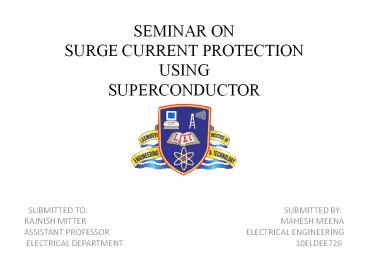SEMINAR ON SURGE CURRENT PROTECTION USING SUPERCONDUCTOR - PowerPoint PPT Presentation
Title:
SEMINAR ON SURGE CURRENT PROTECTION USING SUPERCONDUCTOR
Description:
Here we discussed the use of superconductor as protective device for surge current protection. Superconductors ... SEMINAR ON SURGE CURRENT PROTECTION USING ... – PowerPoint PPT presentation
Number of Views:2518
Avg rating:3.0/5.0
Title: SEMINAR ON SURGE CURRENT PROTECTION USING SUPERCONDUCTOR
1
SEMINAR ONSURGE CURRENT PROTECTION
USINGSUPERCONDUCTOR
- SUBMITTED TO
SUBMITTED BY RAJNISH MITTER
MAHESH
MEENA ASSISTANT PROFESSOR
ELECTRICAL
ENGINEERING ELECTRICAL DEPARTMENT
10ELDEE726
2
CONTENT
- INTRODUCTION
- WHAT IS SURGE CURRENT
- WHAT IS SUPERCONDUCTOR
- TYPES OF SUPERCONDUCTOR
- FAULT CURRENT LIMITER
- PROTECTION SCHEME
- APPLICATION
- FUTURE PLANS
- CONCLUSION
- REFERENCE
3
INTRODUCTION
- Modern power system are growing fast with more
generators, transformers and large network in the
system. whenever a fault occurs there is a need
for the protection of these system. Here we
discussed the use of superconductor as protective
device for surge current protection.
Superconductors conduct electricity, offering
zero resistance below certain temperature. We
study different types of superconductor as fault
current limiter and their working.
4
WHAT IS SURGE CURRENT
- The maximum instantaneous input current drawn by
an electrical device when first it is turn ON ,
is defined as surge current it is also known as
inrush current or input surge current or switch
on surge. Inrush current can be as high as 100
times the normal steady state current and lasts
for less than half a normal 60Hz cycle.
5
Surge current waveform
6
WHAT IS SUPERCONDUCTOR
- An element, inter-metallic alloy or compound that
will conduct electricity without resistance below
a certain temperature. The dutch physicist HEIKE
KAMERLINGH ONNES of leiden university was the
first person to observe superconductivity in
mercury. Superconductivity is a phenomenon of
exactly zero electrical resistance certain
materials when cooled below a characteristics
critical temperature.
7
MEISSNER EFFECT
When you place a superconductor in a magnetic
field, the field is expelled below TC.
B
B
T gtTc
T lt Tc
Magnet
Currents i appear, to cancel B. i x B on the
superconductor produces repulsion.
Superconductor
8
A superconductor displaying the MEISSNER EFFECT
Superconductors have electronic and magnetic
properties. That is, they have a negative
susceptibility, and acquire a polarization
OPPOSITE to an applied magnetic field. This is
the reason that superconducting materials and
magnets repel one another.
If the temperature increases the sample will lose
its superconductivity and the magnet cannot float
on the superconductor.
9
TYPES OF SUPERCONDUCTOR
- Low temperature superconductor
- example - lead and mercury-common LTS
other LTS are Ti, V, Zr, Nb etc. - High temperature superconductor
- exmaple - YBCO, BSCCO, LSCO etc.
10
STRUCTURE OF SUPERCONDUCTOR
YBCO
LSCO
BSCCO
11
FAULT CURRENT LIMITER
- A fault current limiter is a device which limit
prospective fault current when a fault occur.
Generally FCL are superconductor FCL. - Two major categories of FCL
- (1) resistive
- (2) inductive
12
SUPERCONDUCTIVE FCL
Fault control with a FCL
13
APPLICATION OF FCL
- FCLs can be applied in a number of distribution
or transmission areas.
FCL in the main position
14
FCL protect the entire bus
FCL in the bus-tie position
15
ADVANTAGES
16
ADVANTAGE continued
- Safety, reliability, and power quality.
- Cost for C.B. and fuses can be reduced.
- Life of transformers extended.
- Reduced or eliminate wide area, blackouts.
- Provide protection to TD equipments.
17
SUPERCONDUCTIVE FAULT CURRENT LIMITER CONCEPT
(1) series resistive limiter
FCL with HTS trigger coil
18
(2) Inductive limiter
19
FUTURE PLAN
- TEPCO will develop a three-phase limiter over the
next three to four years and test it in the grid
within this century. The current plan is to
introduce solid state breakers for distribution
before installing superconductive FCL. The true
application for the superconducting FCL is at
transmission voltages of 500 kV.
20
REFERENCES
- IEEE transaction on applied superconductivity
- http//www.scribd.com/doc/115890153/surge-current-
protection-using-superconductors - http//jntuhome.com/surge-current-protection-using
-superconductors-seminardownload-full-paper-eee-se
minar-topics/ - http//kguru.info/t-surge-current-protection-using
-superconductors-ppt--55999 - http//en.wikipedia.org/wiki/Surge_protector
- http//www.edaboard.com/thread126937.html
21
CONCLUSION
- The purpose of this paper was the study of surge
current protection using superconductors. The
Superconductor Fault Current Limiters offers
efficient advantages to power systems and opens
up a major application for superconducting
materials.
22
ANY QUERIES??
23
(No Transcript)

